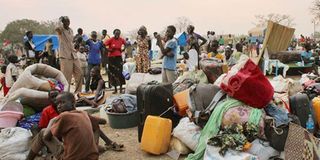Refugees, host districts to benefit from Shs600b project

Refugee children in Adjumani District in northern Uganda. PHOTO | FILE
What you need to know:
- Mr Moses Nyang, the refugee welfare officer for Adjumani District, says there is a need for quick solutions since refugee hosting districts are facing economic and social vulnerability.
The government has earmarked Shs608 billion for the economic empowerment of refugees and host communities in 13 districts across the country.
Madi-Okollo, Terego, Adjumani, Kikuube, Yumbe, Obongi, Kiryandongo, Kyegegwa, Isingiro, Lamwo, Kampala, Kamwenge, and Koboko are some of the districts meant to benefit from the Jobs and Livelihoods Integrated Refugee Plan (JLIRP) that has been designed to run for five years.
Mr Frank Mugabi, the Ministry of Gender spokesperson, said the project is aimed at ensuring economic and financial inclusivity among refugees and host communities.
“The intervention seeks to strengthen and promote economic interaction between refugees and host communities and also food, nutrition and income security of 486,861 refugee and 1,152,087 host community households,” Mr Mugabi said at the weekend.
He added that JLIRP will enable entrepreneurial-led development and market growth, increasing agricultural productivity, production, and marketable volumes as well as promote shock-responsive refugee and host community social protection systems.
“Given the socio-economic impact of Covid-19, JLIRP is more important than ever. It will contribute to resilient, sustainable and inclusive development of refugees and host communities, and increasing access to vocational and technical education,” Mr Mugabi said.
In March 2017, the government, working with development partners, established the Comprehensive Refugee Response Framework to address the challenges associated with its open-door policy. Mr Mugabi said the ministry was assigned to lead and coordinate the development and implementation of JLIRP.
Mr Moses Nyang, the refugee welfare officer for Adjumani District, says there is a need for quick solutions since refugee hosting districts are facing economic and social vulnerability.
“The refugee population has increased the demand for services, putting pressure on already limited resources for livelihood, but also the refugees and host communities are not sufficiently resilient due to the past ineffective and insufficient policies that promote their self-reliance,” he says.




